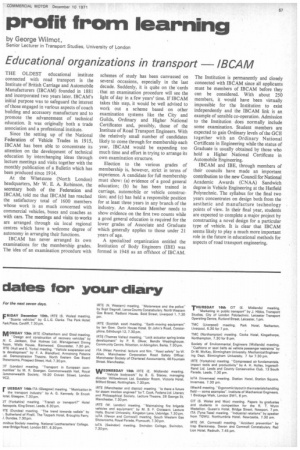profit from learning
Page 59

If you've noticed an error in this article please click here to report it so we can fix it.
by George Wilmot,
Senior Lecturer in Transport Studies, University of London
Educational organizations in transport IBCAM
THE OLDEST educational institute connected with road transport is the Institute of British Carriage and Automobile Manufacturers (IBCAM) founded in 1881 and incorporated two years later. IBCAM's initial purpose was to safeguard the interest of those engaged in various aspects of coach building and accessory manufacture and to promote the advancement of technical education. It was originally both a trade association and a professional institute.
Since the setting up of the National Federation of Vehicle Trades in 1915, IBCAM has been able to concentrate its attention on the development of technical education by interchanging ideas through lecture meetings and visits together with the monthly publication of a Bulletin which has been produced since 1914.
At the Whetstone (North London) headquarters, Mr W. E. A. Robinson, the secretary both of the Federation and IBCAM, told me that IBCAM has reached the satisfactory total of 1600 members whose work is as much concerned with commercial vehicles, buses and coaches as with cars. The meetings and visits to works are arranged through six local regional centres which have a welcome degree of autonomy in arranging their functions.
IBCAM has never arranged its own examinations for the membership grades. The idea of an examination procedure with schemes of study has been canvassed on several occasions, especially in the last decade. Suddenly, it is quite on the cards that an examination procedure will see the light of day in a few years' time. If IBCAM takes this step, it would be well advised to work out a scheme based on other examination systems like the City and Guilds, Ordinary and Higher National Certificates and, possibly, those of the Institute of Road Transport Engineers. With the relatively small number of candidates likely to come through for membership each year, IBCAM would be expending too much time and effort in trying to arrange its own examination structure.
Election to the various grades of membership is, however, strict in terms of experience. A candidate for full membership must show: (a) evidence of a good general education; (b) he has been trained in carriage, automobile or vehicle construction; and (c) has held a responsible position for at least three years in any branch of the industry. An Associate Member needs to show evidence on the first two counts while a good general education is required for the lower grades of Associate and Graduate which generally applies to those under 21 years of age.
A specialized organization entitled the Institution of Body Engineers (IBE) was formed in 1948 as an offshoot of IBCAM. The Institution is permanently and closely connected with IBCAM since all applicants must be members of IBCAM before they can be considered. With about 250 members, it would have been virtually impossible for the Institution to exist independently and the IBCAM link is an example of sensible co-operation. Admission to the Institution does normally include some examination. Student members are expected to gain Ordinary levels of the GCE together with an Ordinary National Certificate in Engineering while the status of Graduate is usually obtained by those who hold a Higher National Certificate in Automobile Engineering.
IBCAM and IBE, through members of their councils have made an important contribution to the new Council for National Academic Awards (CNAA) Sandwich degree in Vehicle Engineering at the Hatfield Polytechnic. The syllabus for the final two years concentrates on design both from the aesthetic and manufacture technology points of view. In their final year, students are expected to complete a major project by constructing a novel design for a particular type of vehicle. It is clear that IBCAM seems likely to play a much more important role in the future in educational methods for aspects of road transport engineering.




































































































